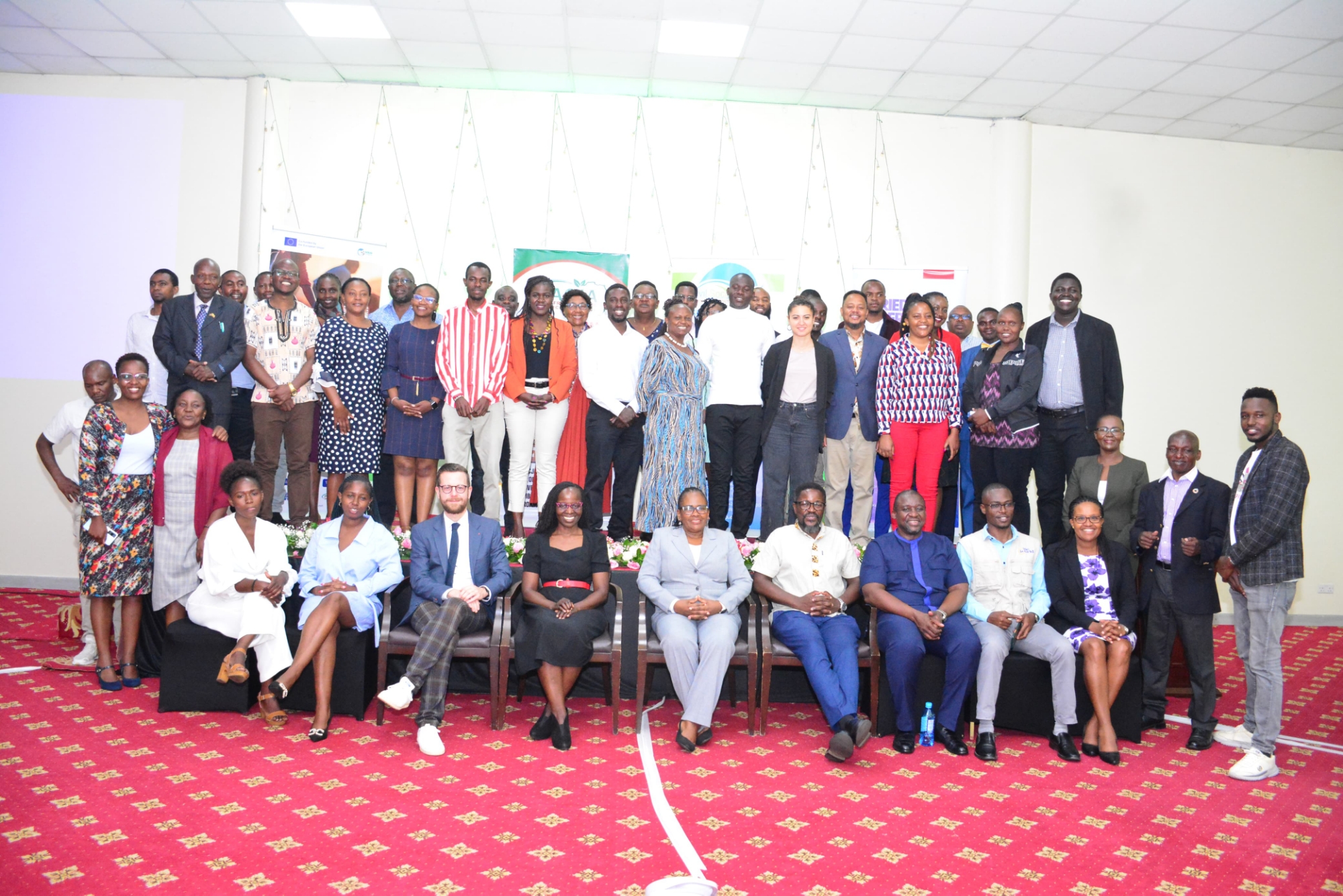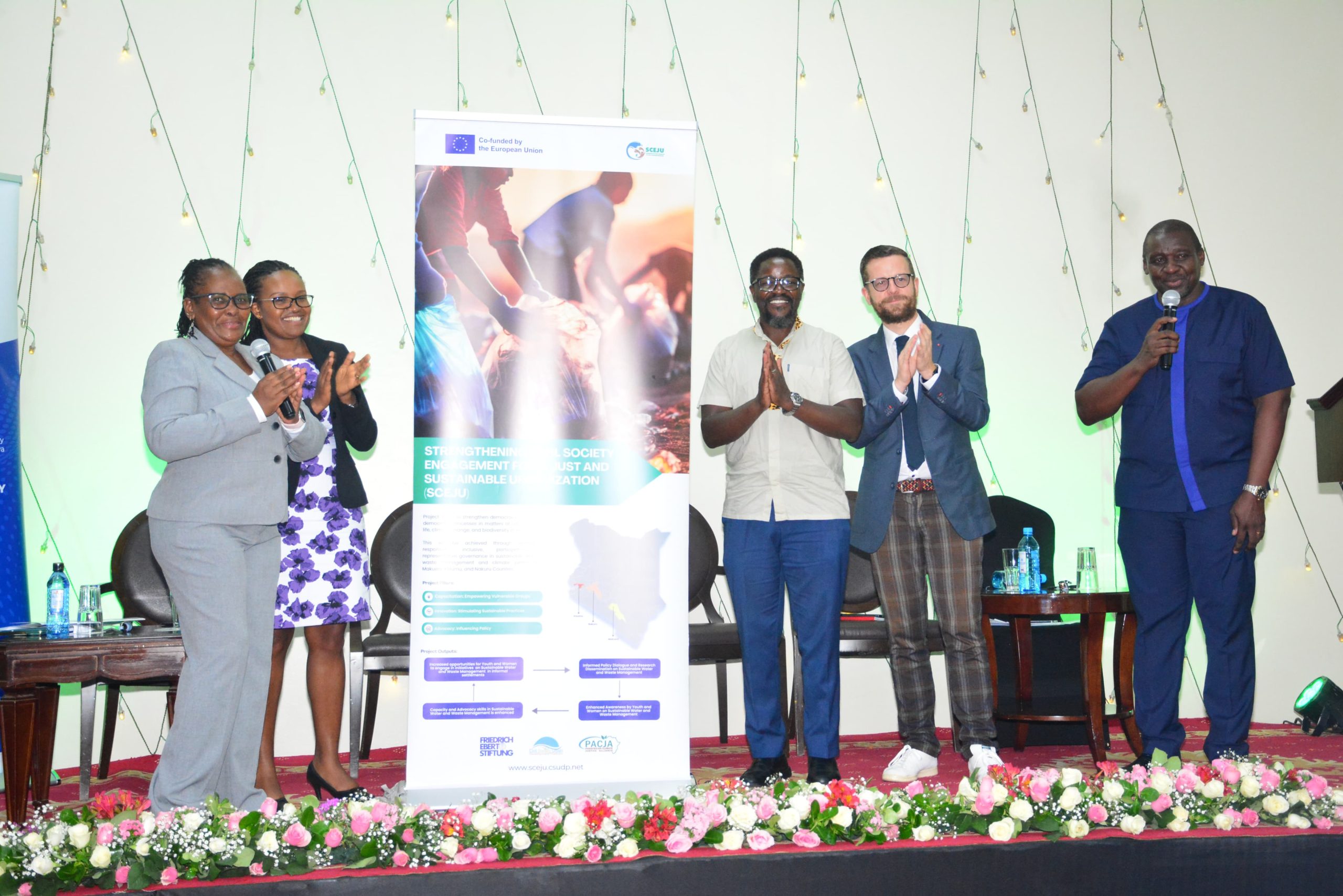From left: Mary Ndugu, Slum Upgrading Department (National Government); Linda Munyao, CSUDP Board Member; Prof. Alfred Omenya, Technical Advisor, SCEJU Project Steering Committee; Bastion Schulz, Country Representative, Friedrich Ebert Stiftung, Kenya Office; and George Wasonga, Chief Executive Officer, Civil Society Urban Development Platform during the launch of SCEJU project on October 31,
In a significant step toward addressing climate challenges in Kenya’s urban and rural areas, a coalition of non-governmental organizations (NGOs) launched the Strengthening Civil Society Engagement for a Just and Sustainable Urbanization (SCEJU) project. Co-funded by the European Union, the initiative is led by the Friedrich-Ebert-Stiftung (FES-Kenya), the Civil Society Urban Development Platform (CSUDP), and the Pan African Climate Justice Alliance (PACJA). The SCEJU project focuses on strengthening democratic processes to tackle pressing urban issues such as climate resilience and biodiversity.
The launch event, held at Nairobi’s Panari Hotel, gathered representatives from across Kenya to discuss SCEJU’s goals and commitment to empowering youth, women, and vulnerable groups in underserved urban communities. Aligned with this year’s World Cities Day theme, “Youth Climate Changemakers: Catalysing Local Action for Urban Sustainability,” the project emphasizes youth leadership in transforming water and waste management practices in Kisumu, Nakuru, and Makueni counties.
Bastian Schulz, Country Representative of FES-Kenya, highlighted the collective strength of the partnership, stating, “PACJA, CSUDP, and FES bring together vast experience from different sectors to work together to overcome existing barriers and make water and waste management not only more inclusive but also more sustainable and equitable. Stronger voices, enhanced capacity, and more just policies are the focus of our joint commitment. By targeting Kisumu, Nakuru, and Makueni counties, SCEJU aims to assist vulnerable urban communities, particularly women and youth, to address persistent challenges that threaten sustainable water and waste management despite constitutional guarantees.”

Despite Kenya’s enactment of the Sustainable Waste Management Act in 2022, which mandates household waste segregation, there remains a significant gap between policy and practice, especially in informal settlements where access to basic services such as clean water and waste management is lacking. Schulz added, “The SCEJU project is about creating an inclusive platform where communities can advocate for policies that improve their quality of life. Our aim is to make these essential services sustainable and equitable for all.”
The project strongly emphasizes youth involvement, recognizing young Kenyans’ potential to drive environmental change. “Youth are the backbone of our climate change efforts,” said George Wasonga, CEO of CSUDP. “By engaging youth in sustainable development, especially in informal settlements, we’re investing in a future where urban sustainability is community-led.” Wasonga encouraged young people from various backgrounds to use their creativity, be it through social media, the arts, or entrepreneurship, to advocate for environmental justice.
Reflecting on the 2024 World Cities Day theme, Wasonga added, “The theme, ‘Youth Climate Changemakers: Catalysing Local Action for Urban Sustainability,’ is apt as it places youth as key drivers in catalysing local action. SCEJU’s approach is focused on unlocking the inherent innovative potential within young people to drive change in the delivery of water and waste services within informal settlements.”
The SCEJU initiative also prioritizes women and other vulnerable groups, who are integral to providing last-mile services in urban settlements but often remain excluded from policy discussions. “Youth and women are essential to improving water and waste management in urban areas, yet they rarely have a voice in shaping these policies,” said Titus Kaloki, Programme Coordinator for FES-Kenya. “Through SCEJU, we’re amplifying their voices and ensuring they lead the way toward sustainable solutions.”
In addition to youth engagement, SCEJU fosters community collaboration, creating spaces where local voices can contribute to policy discussions. Charles Mwangi, Head of Programmes and Research at PACJA, stressed that “climate justice must include those who bear the brunt of the climate crisis. Through the SCEJU, we’re empowering communities not only to participate but to lead in creating a climate-resilient future.” He added, “Despite youth and women from urban informal settlements providing essential services in water and waste management, they are often excluded from policy decision-making processes that would empower them. SCEJU seeks to strengthen their voices to influence better outcomes for communities in Makueni, Nakuru, and Kisumu counties.”
The event achieved several key objectives, including bringing together project beneficiaries, partners, and government agencies to foster networking and a shared understanding of SCEJU’s mission. It also served as a platform for raising public awareness and engaging the media, which will play an essential role in amplifying the project’s message.
Through training, policy advocacy, and community projects, SCEJU aims to build a resilient urban community in Kenya by 2026. By placing youth and vulnerable groups at the forefront of sustainable development, the initiative aspires to set a foundation for equitable urban policies and pave the way for a greener future in Kenya’s cities.










